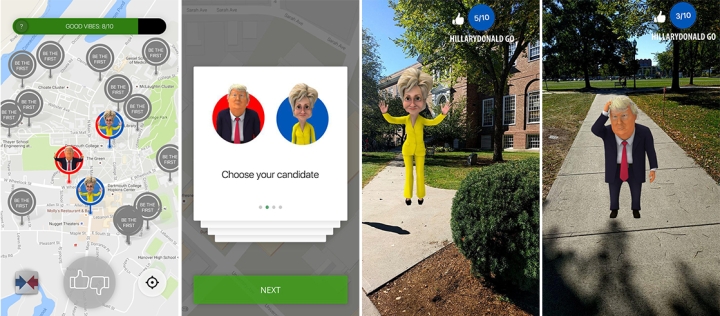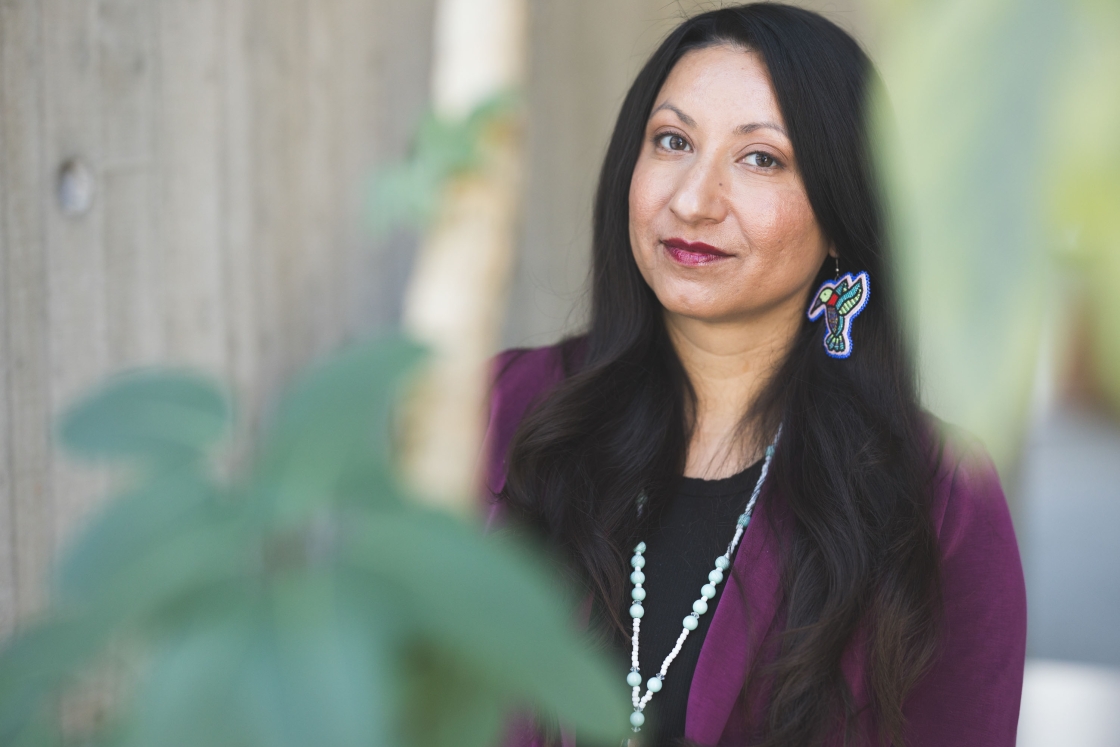Oct. 13, 2016 – With the U.S. presidential election just weeks away, Dartmouth researchers have designed a new way for Hillary Clinton and Donald Trump fans to show their support with HillaryDonald Go—a political augmented reality game that aims to combine the fun of Pokemon Go with the energy of the 2016 election season. Players must find the nearest Hillary/Donald ‘booth’ near them and send their candidate good vibes to make their candidate grow in support, as candidates vie to win the booth. Players are tasked to try to stop the candidate they dislike from taking over the town!
Image  |
Sample screenshots from HillaryDonald Go, the political augmented reality game. |
Through the HillaryDonald Go app, players follow maps to find a candidate ‘booth’ near them, where an augmented reality with 3-D caricatures of Hillary Clinton and Donald Trump await. Once players are within range of a booth, they can select Clinton or Trump, shake their phones to send more points or ‘good vibes’ to their candidate, take selfies with the 3-D candidates and share the images with friends. Each step allows players to accrue points or ‘good vibes’ for the candidate that they like. All players can see the running tally of points or good vibes for Clinton versus Trump, as they vie to flip the booth in favor of their candidate. Once a booth has received over 50 percent of the points/good vibes in favor of a candidate, the booth takes on the face of that candidate. The candidates will react with humorous expressions of joy or sadness, in response to players’ choices. Players can hear real soundbytes from past remarks by Clinton and Trump, saying statements respectively, such as “thank you for this amazing welcome” or “I don’t like that.” The HillaryDonald Go app is available for free through the App Store and Google Play.
HillaryDonald Go can be played in nearly 1 million locations or booths in parks, libraries, monuments, cafes and other public places of local interest throughout all 50 states of the U.S.; new locations are being added regularly. Booths have also been placed in U.S. embassies and consulates around the world to enable U.S. citizens abroad to also join in the fun.
Dartmouth professors Mikhail Gronas, a specialist in digital humanities and Slavic studies, and Joseph Bafumi, a specialist in American politics, teamed up to create HillaryDonald Go with developers.
“Since the birth of democracy in ancient Greece, modern politics has been, in essence, a competitive game. Games are often considered a less serious social activity; however, elections are some of our nation’s most important political decisions and are very much game-like: we follow the scores or polls, and we root for our teams,” said Mikhail Gronas at Dartmouth. “Perhaps, HillaryDonald Go can inject some lighthearted competition into this election season, lessen the acrimony and allow us to take a brief break from the tensions of the campaign,” added Gronas.
“With the launch of HillaryDonald Go during these last few weeks before Election Day, we hope to engage more people into the political process, including those who may not otherwise be politically active,” said Joseph Bafumi at Dartmouth. “The game may even encourage some to vote in this election. The HillaryDonald Go app may also give social scientists and political pundits a sense of electoral mood across geographic spaces in a way that polls cannot easily do,” explained Bafumi.
An intersection between gaming and political science, HillaryDonald Go presents a gamified survey of enthusiasm for candidates, and is the second project that Bafumi and Gronas have collaborated on. They also launched HillaryDonald.com, a set of tools that allow users to react, view and track reactions to the presidential campaign in real-time, including the HillaryDonald app for which users can shake their phones to express support for one of the candidates during live presidential debates, and the Twitterscope app, which measures and visualizes political sentiment on Twitter for which they worked with Anna Rumshisky at UMass Lowell. HillaryDonald Go is based on the same react.to phone-shaking technology that operates the HillaryDonald app.
HillaryDonald Go’s co-creators Mikhail Gronas at mikhail.gronas@dartmouth.edu and Joseph Bafumi at joseph.bafumi.jr@dartmouth.edu are available for comment.

